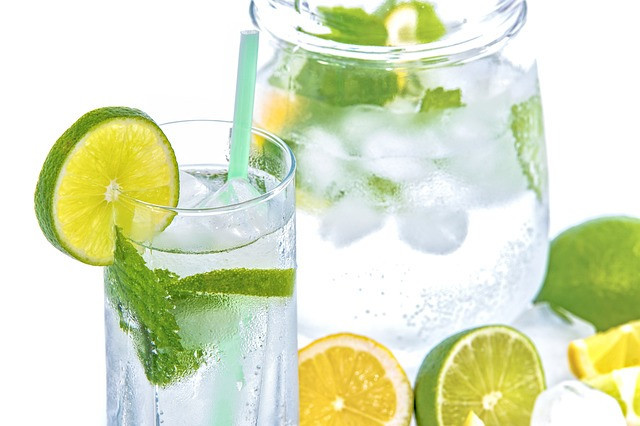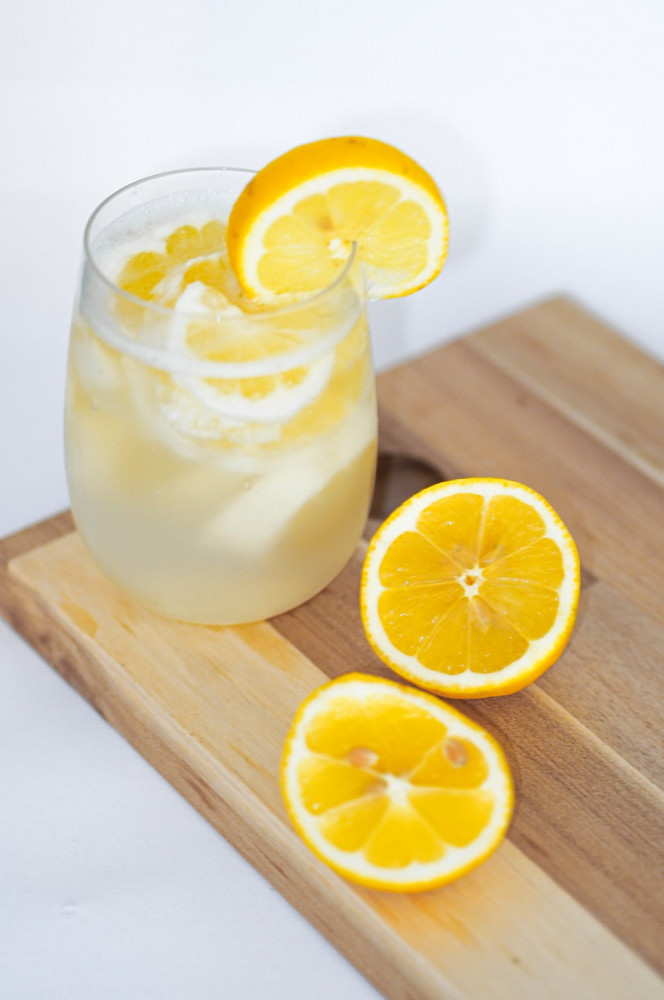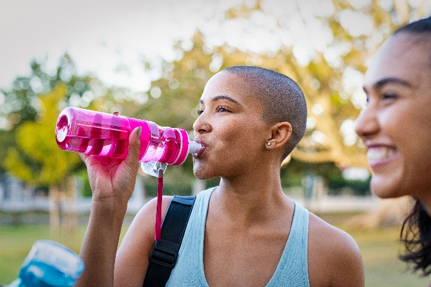Water: How much should you drink every day?
Water is essential to good health. Are you getting enough? These guidelines can help you find out.
How much water should you drink each day? It’s a simple question with no easy answer.
Studies have produced varying recommendations over the years. But your individual water needs depend on many factors, including your health, your activity, and where you live.
No single formula fits everyone. However, knowing more about your body’s need for fluids will help you estimate how much water to drink daily.
What are the health benefits of water?
Water is your body’s principal chemical component and makes up about 50% to 70% of your body weight. Your body depends on water to survive.
Every cell, tissue, and organ in your body needs water to work correctly. For example, water:
- Gets rid of wastes through urination, perspiration, and bowel movements
- Keeps your temperature normal
- Lubricates and cushions joints
- Protects sensitive tissues
Lack of water can lead to dehydration — a condition that occurs when you don’t have enough water to perform normal functions. Even mild dehydration can drain your energy and make you tired.
How much water do you need?
Every day, you lose water through your breath, sweat, urine, and bowel movements. For your body to function correctly, you must replenish its water supply by consuming beverages and foods that contain water.
So, how much fluid does the average, healthy adult living in a temperate climate need? The U.S. National Academies of Sciences, Engineering, and Medicine determined that an adequate daily fluid intake is:
- About 15.5 cups (3.7 liters) of fluids a day for men
- About 11.5 cups (2.7 liters) of fluids a day for women
These recommendations cover fluids from water, other beverages, and food. About 20% of daily fluid intake usually comes from food and the rest from drinks.
What about the advice to drink eight glasses a day?
You’ve probably heard the advice to drink eight glasses of water daily. That’s easy to remember, and it’s a reasonable goal.
Most healthy people can stay hydrated by drinking water and fluids whenever they are thirsty. For some people, fewer than eight glasses a day might be enough. But other people might need more.
You might need to modify your total fluid intake based on several factors:
- Exercise. If you do any activity that makes you sweat, you must drink extra water to cover the fluid loss. It’s essential to drink water before, during, and after a workout.
- Environment. Hot or humid weather can make you sweat and require additional fluid. Dehydration also can occur at high altitudes.
- Overall health. Your body loses fluids with a fever, vomiting, or diarrhea. Drink more water or follow a doctor’s recommendation to drink oral rehydration solutions. Other conditions requiring increased fluid intake include bladder infections and urinary tract stones.
- Pregnancy and breast-feeding. If you are pregnant or breastfeeding, you may need additional fluids to stay hydrated.
Is water the only option for staying hydrated?
No. You can rely on more than just water to meet your fluid needs. What you eat also provides a significant portion. For example, many fruits and vegetables, such as watermelon and spinach, are almost 100% water by weight.
In addition, beverages such as milk, juice, and herbal teas are composed mainly of water. Even caffeinated drinks — such as coffee and soda — can increase your daily water intake. But go easy on sugar-sweetened beverages. Regular soda, energy or sports drinks, and other sweet drinks usually contain added sugar, which may provide more calories than needed.
How do I know if I’m drinking enough?
Your fluid intake is probably adequate if:
- You rarely feel thirsty
- Your urine is colorless or light yellow
Your doctor or dietitian can help you determine the amount of water that’s right for you daily.
To prevent dehydration and make sure your body has the fluids it needs, make water your beverage. It’s a good idea to drink a glass of water:
- With each meal and between meals
- Before, during, and after exercise
- If you feel thirsty
Should I worry about drinking too much water?
Drinking too much water is rarely a problem for healthy, well-nourished adults. Athletes occasionally may drink too much water to prevent dehydration during long or intense exercise. When you drink too much water, your kidneys can’t eliminate the excess water. The sodium content of your blood becomes diluted. This is called hyponatremia, and it can be life-threatening.
Is alkaline water better for you than plain water?
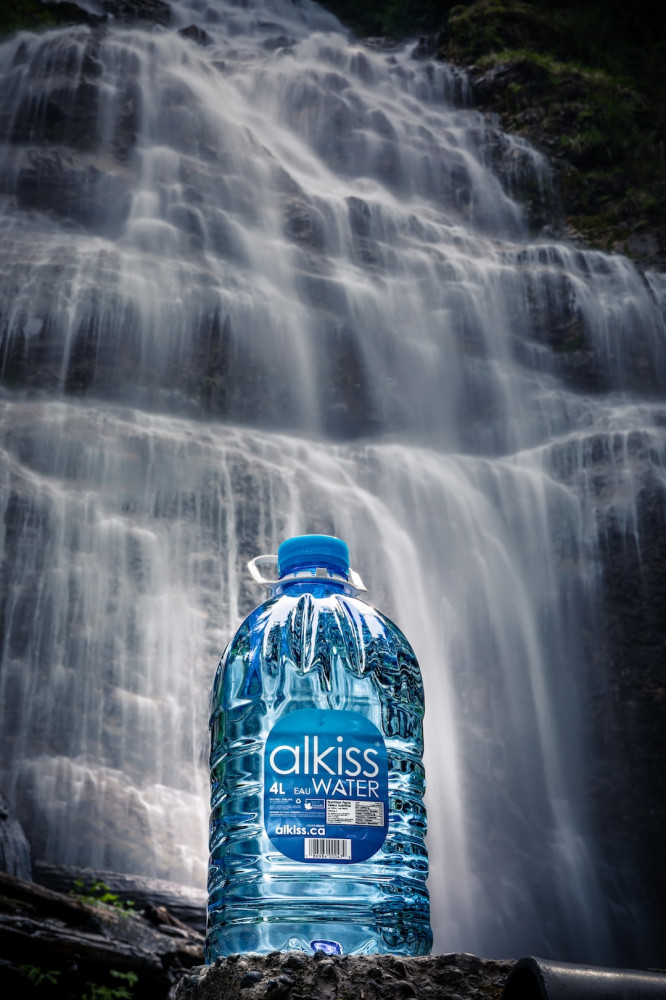
For most people, alkaline water is just as good as plain water.
Bottled water sold as alkaline water, regulated by the U.S. Food and Drug Administration, might have nutrients added to it to achieve an alkaline pH.
Alkaline water has a higher pH level than that of plain tap water. So, proponents say that it can neutralize acid in your bloodstream. Some say that alkaline water can help prevent diseases such as cancer and heart disease. However, more research is needed to verify these claims.
Some studies also suggest that alkaline water might help slow bone loss. However, further studies are needed to determine if it influences overall bone mineral density and if the benefit continues over the long term.
What is coconut water, and what’s behind the hype?
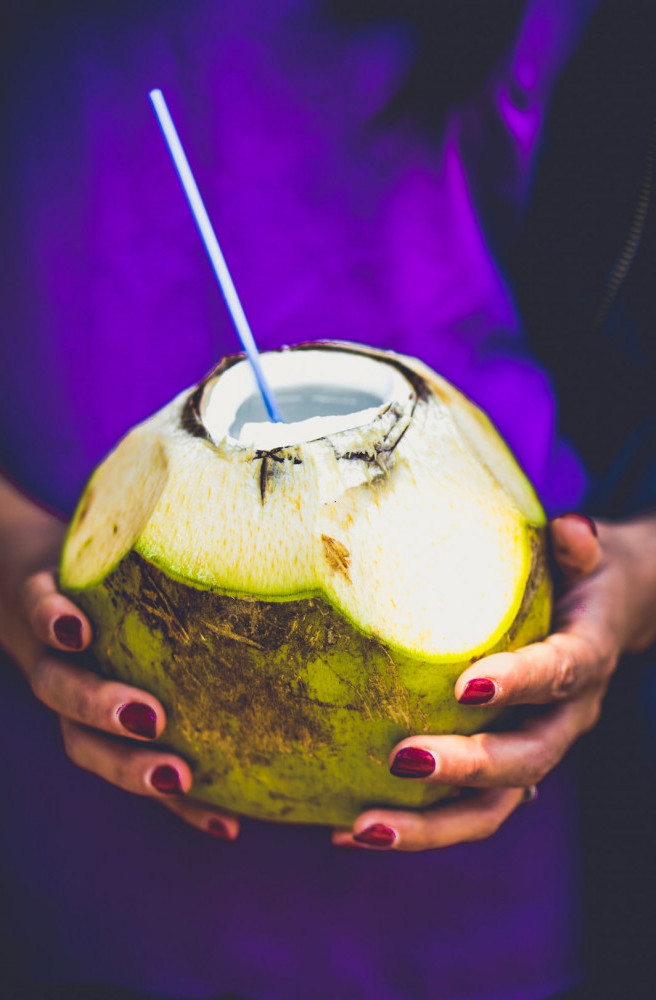
Coconut water is the clear fluid inside coconuts. It’s not the same as coconut milk, a blend of coconut water and grated coconut
So, coconut water is a type of juice. Unlike other liquids, unflavored coconut water is low in added sugar and calories.
Some people drink coconut water for its electrolytes. Those are charged minerals that help you stay hydrated. The body loses water and electrolytes from sweating during exercise or hard work and from illnesses such as diarrhea. Electrolytes in coconut water include potassium, sodium, and manganese. The amounts vary by brand.
Sports drinks, like coconut water, also have electrolytes. Some evidence suggests that coconut water may be compared to having a sports drink. But coconut water is no more hydrating than plain water.
As a casual drink, coconut water is considered safe. It does have calories — about 45 to 60 calories in an 8-ounce serving. Weighing the pros and cons, plain water is still the smart choice.
Why You Get Dehydrated When Playing Golf
Dehydration occurs when you use or lose more fluid than you take in, and your body doesn’t have enough water and other fluids to carry out its normal functions. If you don’t replace lost fluids, you will get dehydrated.
Anyone may become dehydrated, but the condition is hazardous for young and older adults.
The most common cause of dehydration in young children is severe diarrhea and vomiting. Older adults naturally have a lower volume of water in their bodies, and may have conditions or take medications that increase the risk of dehydration.
This means that even minor illnesses, such as infections affecting the lungs or bladder, can result in dehydration in older adults.
Dehydration also can occur in any age group if you don’t drink enough water during hot weather — especially if you are exercising vigorously.
You can usually reverse mild to moderate dehydration by drinking more fluids, but severe dehydration needs immediate medical treatment.
Dehydration Symptoms When Playing Golf
Thirst isn’t always a reliable early indicator of the body’s need for water. Many people, particularly older adults, feel thirsty once they’re already dehydrated. That’s why it’s important to increase water intake during hot weather or when you’re ill.
The signs and symptoms of dehydration also may differ by age.
Infant or young child
- Dry mouth and tongue
- No tears when crying
- No wet diapers for three hours
- Sunken eyes, cheeks
- Sunken soft spot on top of skull
- Listlessness or irritability
Adult
- Extreme thirst
- Less frequent urination
- Dark-colored urine
- Fatigue
- Dizziness
- Confusion
When to see a doctor
Call your family doctor if you or a loved one:
- Has had diarrhea for 24 hours or more
- Is irritable or disoriented and much sleepier or less active than usual
- Can’t keep down fluids
- Has bloody or black stool
How To Avoid Dehydration Out On The Golf Course
Dehydration means your body does not have as much water and fluids as it should. This can be caused by losing too much liquid, not drinking enough water or fluids, or both. Vomiting and diarrhea are common causes.
Infants and children are more susceptible to dehydration than adults because of their smaller body weights and higher turnover of water and electrolytes. The elderly and those with illnesses are also at higher risk.
Dehydration is classified as mild, moderate, or severe based on how much of the body’s fluid is lost or not replenished. When intense, dehydration is a life-threatening emergency
.
Symptoms
- Dry or sticky mouth.
- Low or no urine output; concentrated urine appears dark yellow.
- Not producing tears.
- Sunken eyes.
- Markedly sunken fontanelles (the soft spot on the top of the head) in an infant.
- Lethargic or comatose (with severe dehydration).
- In addition to the symptoms of actual dehydration, you may also have:
- vomiting
- diarrhea
- the feeling that you “can’t keep anything down”
Treatment
- Drinking fluids is usually sufficient for mild dehydration. It is better to have frequent, small amounts of fluid (using a teaspoon or syringe for an infant or child) rather than trying to force large amounts of fluid at one time. Drinking too much fluid at once can bring on more vomiting.
- Electrolyte solutions or freezer pops are especially effective. These are available at pharmacies. Sports drinks contain a lot of sugar and can cause or worsen diarrhea. In infants and children, avoid using water as the primary replacement fluid.
- Intravenous fluids and hospitalization may be necessary for moderate to severe dehydration. The doctor will try to identify and then treat the cause of the dehydration.
Treatment includes starting NS@20ml/kg slow push until signs of severe dehydration disappear. Avoid Ringer Lactate till the patient passes urine. Maintenance fluid depends on body weight. Either DNS or RL may be used 10 kg and less 100ml/Kg 10–20 kg 1000mL+50ml/kg 20+ Kg 1500ml+ 20 ml/kg It may be advisable to give half the calculated fluid in the first 8 hours and the remaining over the next 16 hours
- Precautions
Could you check for pulmonary edema and replenish Potassium as required? Chills may occur due to fluid administration, ruling out infectious causes
- Most cases of stomach viruses (also called viral gastroenteritis) tend to resolve independently after a few days.
Why Golfers Should Drink Lemon Water
What is lemon water?
Lemons and other citrus fruits are well known for their colorful pitted skins and tart, refreshing taste. Lemon water is the juice of the lemon fruit combined with water and maybe drunk hot or cold, with additions such as lemon zest, honey, mint or spices like turmeric or cayenne pepper.
Discover our full range of health benefit guides, or check out some of our best lemon recipes.
Nutritional benefits of lemon water
A glass (150ml) of lemon water with the juice of 1 lemon provides approximately:
- 4Kcal / 16KJ
- 0.1g Protein
- 0.8g Carbohydrate
- 65mg Potassium
- 18mg Vitamin C
Top 5 health benefits of lemon water
Headlines have linked drinking lemon water to many health claims, including weight loss, improved digestion, ‘alkalising’ effects on the body, improved skin, and detoxification. The research, especially human studies, to support these health claims is minimal, but we can draw from studies that have looked at the benefits of these two ingredients in isolation.
1. A source of hydration
Water is a critical nutrient, and without it, we can survive for only a few days. It makes up 75% of the body weight of an infant and 55% of an adult. If you are someone who finds it difficult to drink water, then adding lemon to hot or cold water can make it more palatable.
Dehydration is common and can present with headaches, dizziness, and tiredness – it’s essential to ensure you consume enough fluid while exercising or in hot weather. The NHS advises drinking 6-8 glasses of fluid, ideally water, daily.
2. Source of vitamin C
For centuries, lemons were highly regarded for treating scurvy, a now rare condition that can develop through a lack of vitamin C (ascorbic acid). Vitamin C is often claimed to support the immune system. However, studies remain inconclusive. One study found that although vitamin C did not prevent otherwise healthy people from catching the common cold, it may shorten the duration of symptoms, and it may halve the common cold risk in people exposed to short periods of extreme physical stress (e.g. marathon runners).
3. May support skin health
Some evidence has linked vitamin C (or ascorbic acid) and flavonoids, protective compounds found in citrus fruit, to improved skin condition. Vitamin C is known to help the body produce collagen, which contributes to the integrity of the skin.
Interestingly, a study in 2016 indicated that a citrus-based juice drink may help prevent the damaging effects that lead to premature skin aging in mice.
4. May aid digestion
Some people find drinking a glass of lemon water, particularly first thing in the morning, aids digestive regularity. Although this is mainly subjective and reports are anecdotal, studies on mice do show some promise. A 2019 study suggested that life-long consumption of a drink rich in lemon polyphenols appeared to delay age-related changes in the gut, including changes in the balance of beneficial gut bacteria.
5. May help prevent kidney stones
The citric acid in lemon juice may help prevent kidney stones caused by a build-up of calcium oxalate, and the extra fluid from the water may help maintain hydration and flush out potential kidney stones…

Is lemon water safe for everyone?
Generally safe for most people, there are a couple of considerations if you drink lemon water. This includes the possible erosion of tooth enamel, and for those who experience heartburn, you may find your symptoms are aggravated by drinking lemon water. However, the effect of this is variable, with some heartburn sufferers experiencing relief after consuming lemon water.
How to make lemon water
Lemon water is simply that: the juice and/or slices of lemon, including the peel, in water. Warm or cold water is up to you. You can add other ingredients and flavors, such as orange or mint, if desired. The lemons can be juiced (in advance if convenient) and even stored in ice cube trays for freezing. Rolling a lemon between your hands or on a work surface before juicing is said to yield more juice. Unwaxed lemons make the ideal choice if you want to use the lemon zest or add lemon slices to water. If only waxed lemons are available, gently scrub the peel before use.
Did you know that 60% of your body is made up of water? Almost 3/4 of the adult brain is made up of… You guess it’s water!
Babies have the highest percentage of water weight at over 75%. The percentage declines as the person ages, but the importance of water remains constant.
Why is it important to stay hydrated?
I’m sure you have been told to drink more water, but why is it important to stay hydrated? And why does it make up so much of your body? Water plays a variety of roles; here are a few examples:
- Temperature Control- First, you have likely experienced increased thirst after intense exercise or being outside in the heat all day. This response is due to water loss in the form of sweat. Sweat controls the body’s temperature to keep it in a good range for normal functioning. (NOTE: Thirst is not your best indicator of hydration status, particularly in older adults. Drink water before you get thirsty.)
- Getting Rid of Waste- After you have satisfied that thirst, you must use the restroom. Water plays a role in eliminating waste from the blood through urination.
- Protecting Joints and Organs- Water protects your body by acting as a lubricant for your joints. It also acts as a shock absorber for your organs and spinal cord. When you land from a jump, for example, water helps cushion the disks in your spine and the bones in your knees.
Now you get why it’s essential to consume enough water…. for these basic functions and many more.
So how much water should I be drinking?
It is recommended that adult males get about 15.5 cups of fluids per day and adult females get 11.5 cups per day[1](Table 1).
Total Fluid Recommendation For AdultsGenderTotal Fluids (Cups/Day)Female11.5Male15.5
About 20% of the fluid you need will come from your food. Beverages will make up the other 80%. An easy-to-remember goal to reach that 80% is to drink eight 8-oz glasses of water daily.
The amount of water each person should drink for adequate hydration depends on several factors, such as activity level and pregnancy. Recommendations for children’s water intake are in the table below (Table 2).
Water Recommendations For KidsAgeGenderTotal Water (Cups/Day)4-8 years Girls & Boys 79-13 yearsGirls 9Boys 1014-18 yearsGirls 10Boys 14
Would you be ready to up your water game? Here are ten tips to help you drink more water:
- Put a glass of water by your bed, and when your alarm goes off in the morning, start your day by drinking water.
- Set healthy habits– Tie water drinking to an already set habit. For example, drink a glass every time you brush your teeth, take your pills, eat a meal, sit down to watch a program, or use the restroom.
- Make it exciting– Try infusing your water to add some flavor and color without adding calories. Check out these recipes for inspiration, or let your kids create unique flavor combinations!
- Take it with you– Carry a reusable bottle to work or on errands to remind yourself to stay hydrated. This can also help you Start your day off right– Put a glass of water by your bed, and when your alarm goes off in the morning, start your day by tracking how much water you have had that day.
- Get competitive– Start a friendly competition with your family, co-workers, or friends to challenge each other to meet their personal daily goals each week.
- Eat your water– As you read above, some water intake comes through your food. Choose water-rich foods for your meals, such as zucchini, tomatoes, watermelon, cucumbers, oranges, and celery.
- Swap it out– Trade out one sugary beverage weekly for water. Can you trade out more next week?
- Pair it– If you like drinking tea or coffee throughout the day, try taking one sip of water between each sip of your beverage to up your water intake. You can also drink a glass of water while the coffee brews or tea steeps.
- Fuel your exercise– Bring a water bottle when you work out. Be sure to drink water before and after exercise to account for water loss.
- Chill it– Add ice to your smoothies and beverages to sneak in more water.
Let us know what has worked for you! If any of these tips have helped you drink more water or if you have any hydration hacks of your own, we’d love to hear about them.
[1] The National Academies of Science, Engineering, and Medicine, 2005
[3] United States Geological Survey

